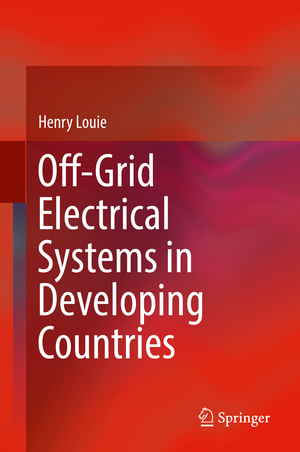Off-Grid Electrical Systems in Developing Countries
Autor Henry Louieen Limba Engleză Hardback – 9 aug 2018
Chapters expertly integrate the technical aspects of off-grid systems with lessons learned from industry-practitioners taking a pragmatic, data-driven perspective. A variety of off-grid systems and technologies are discussed, including solar, wind, hydro, generator sets, biomass systems, battery storage and converters. Realistic examples, case studies and practical considerations from actual systems highlight the interaction of off-grid systems with the economic, environmental, social and broader development aspects of rural electrification. Whole chapters are dedicated to the operation and control of mini-grids, load and resource estimation, and design of off-grid systems. Special topics focused on electricity access in developing countries are included, such as energy use in rural communities, technical and economic considerations of grid extension, electricity theft, metering, and best practices devoted to common problems.
Each chapter is instructor friendly and contains illustrative examples and problems that reinforce key concepts. Complex, open-ended design problems throughout the book challenge the reader to think critically and deeply. The book is appropriate for use in advanced undergraduate and graduate courses related to electrical and energy engineering, humanitarian engineering, and appropriate technology.
- Provides a technical foundation of off-grid electrical systems;
- Contextualizes the technical aspects for developing countries;
- Captures the current and state-of-the art in this rapidly developing field.
| Toate formatele și edițiile | Preț | Express |
|---|---|---|
| Paperback (1) | 466.66 lei 6-8 săpt. | |
| Springer International Publishing – 25 ian 2019 | 466.66 lei 6-8 săpt. | |
| Hardback (1) | 571.16 lei 3-5 săpt. | +36.59 lei 7-11 zile |
| Springer International Publishing – 9 aug 2018 | 571.16 lei 3-5 săpt. | +36.59 lei 7-11 zile |
Preț: 571.16 lei
Preț vechi: 713.95 lei
-20% Nou
Puncte Express: 857
Preț estimativ în valută:
109.29€ • 114.12$ • 90.25£
109.29€ • 114.12$ • 90.25£
Carte disponibilă
Livrare economică 25 martie-08 aprilie
Livrare express 11-15 martie pentru 46.58 lei
Preluare comenzi: 021 569.72.76
Specificații
ISBN-13: 9783319918891
ISBN-10: 3319918893
Pagini: 342
Ilustrații: XXIII, 481 p. 269 illus., 110 illus. in color.
Dimensiuni: 155 x 235 x 36 mm
Greutate: 0.92 kg
Ediția:1st ed. 2018
Editura: Springer International Publishing
Colecția Springer
Locul publicării:Cham, Switzerland
ISBN-10: 3319918893
Pagini: 342
Ilustrații: XXIII, 481 p. 269 illus., 110 illus. in color.
Dimensiuni: 155 x 235 x 36 mm
Greutate: 0.92 kg
Ediția:1st ed. 2018
Editura: Springer International Publishing
Colecția Springer
Locul publicării:Cham, Switzerland
Cuprins
Energy Development.- Development of Fundamentals.- Grid Extension.- Off-Grid Systems.- Control of Off-Grid Systems.- Control of Off-Grid Systems.- Off-Grid Design Approaches.- Solar Home Systems & Solar Lanterns.- Economic and Business Considerations.- Practical Considerations.- Grid Connected Issues.- Case Studies.
Notă biografică
Dr. Henry Louie received his B.S.E.E. degree from Kettering University in 2002, his M.S. degree from the University of Illinois at Urbana-Champaign in 2004 and his PhD in Electrical Engineering from the University of Washington in 2008. He is an Associate Professor in the Department of Electrical and Computer Engineering at Seattle University. Dr Louie is a 2015/2016 recipient of the prestigious Fulbright Scholar award to Copperbelt University in Kitwe, Zambia. Dr. Louie’s research areas include electrification access in developing communities, renewable energy and appropriate technology. He is the President and Co-founder of KiloWatts for Humanity, a non-profit organization providing electricity access and business opportunities in sub-Saharan Africa. He has deployed several renewable off-grid systems in Zambia and Kenya. In 2017, Dr. Louie joined the editorial board of the Elsevier-indexed journal “Energy for Sustainable Development.” He is on the steering committee of IEEE Smart Village and was the youngest person to serve as a Vice President of the IEEE Power & Energy Society. He is a founding member of the IEEE PES Working Group on Sustainable Energy Systems for Developing Communities. Dr. Louie is recognized as an IEEE Distinguished Lecturer for his expertise on energy poverty. He is a Senior Member of the IEEE and a registered professional engineer in Zambia.
Textul de pe ultima copertă
This book provides students and practicing engineers with a comprehensive guide to off-grid electrification: from microgrids and energy kiosks to solar home systems and solar lanterns. As the off-grid electrification industry grows, universities are starting and expanding courses and programs in humanitarian engineering and appropriate technology. However, there is no textbook that serves this growing market. This book fills that gap by providing a technical foundation of off-grid electrical systems, putting into context the technical aspects for developing countries, and discussing best practices by utilizing real-world data.
Chapters expertly integrate the technical aspects of off-grid systems with lessons learned from industry-practitioners taking a pragmatic, data-driven perspective. A variety of off-grid systems and technologies are discussed, including solar, wind, hydro, generator sets, biomass systems, battery storage and converters. Realistic examples, case studies and practical considerations from actual systems highlight the interaction of off-grid systems with the economic, environmental, social and broader development aspects of rural electrification. Whole chapters are dedicated to the operation and control of mini-grids, load and resource estimation, and design of off-grid systems. Special topics focused on electricity access in developing countries are included, such as energy use in rural communities, technical and economic considerations of grid extension, electricity theft, metering, and best practices devoted to common problems.
Each chapter is instructor friendly and contains illustrative examples and problems that reinforce key concepts. Complex, open-ended design problems throughout the book challenge the reader to think critically and deeply. The book is appropriate for use in advanced undergraduate and graduate courses related to electrical and energy engineering, humanitarian engineering, and appropriate technology.
Chapters expertly integrate the technical aspects of off-grid systems with lessons learned from industry-practitioners taking a pragmatic, data-driven perspective. A variety of off-grid systems and technologies are discussed, including solar, wind, hydro, generator sets, biomass systems, battery storage and converters. Realistic examples, case studies and practical considerations from actual systems highlight the interaction of off-grid systems with the economic, environmental, social and broader development aspects of rural electrification. Whole chapters are dedicated to the operation and control of mini-grids, load and resource estimation, and design of off-grid systems. Special topics focused on electricity access in developing countries are included, such as energy use in rural communities, technical and economic considerations of grid extension, electricity theft, metering, and best practices devoted to common problems.
Each chapter is instructor friendly and contains illustrative examples and problems that reinforce key concepts. Complex, open-ended design problems throughout the book challenge the reader to think critically and deeply. The book is appropriate for use in advanced undergraduate and graduate courses related to electrical and energy engineering, humanitarian engineering, and appropriate technology.
- Provides a technical foundation of off-grid electrical systems;
- Contextualizes the technical aspects for developing countries;
- Captures the current and state-of-the art in this rapidly developing field.
Caracteristici
Provides a technical foundation of off-grid electrical systems Contextualizes the technical aspects for developing countries Captures the current and state-of-the art in this rapidly developing field

























